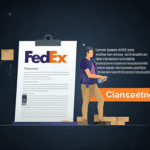Understanding the Benefits of FedEx Freight Insurance
As a business owner who regularly ships products, ensuring that your shipments reach their destination in excellent condition is paramount. Despite the best packaging and shipping practices, unforeseen accidents can occur. Freight insurance offers an added layer of protection for your shipments during transit. This article provides an in-depth analysis of FedEx Freight Insurance, covering its coverage options, cost factors, claims process, and more, enabling you to make an informed decision for your business.
Why Freight Insurance is Essential
Protection Against Loss and Damage
Freight insurance is crucial for businesses that frequently ship goods. It ensures that your shipments are covered in the event of damage, theft, or loss. Carriers often have limited liability based on their policies and destination, which may not fully cover the value of your goods. Freight insurance bridges this gap, guaranteeing full-value protection.
Financial Security
Unforeseen circumstances like natural disasters or delays can lead to significant financial losses, including storage fees or lost sales. Freight insurance helps mitigate these costs, minimizing the financial impact on your business.
Customer Trust and Satisfaction
Maintaining good relationships with customers is essential. If a shipment is lost or damaged, being insured allows your business to promptly resolve issues, demonstrating commitment to customer satisfaction and building trust.
FedEx Freight Insurance Explained
What is FedEx Freight Insurance?
FedEx Freight Insurance is a service provided by FedEx that offers coverage for lost or damaged freight shipments. Available for FedEx Freight® Priority, FedEx Freight® Economy, and FedEx Freight® Box, it covers shipments valued up to $100,000.
Types of Coverage
FedEx Freight Insurance offers two primary coverage options:
- Declared Value: Declare the value of your shipment up to $100,000 and pay a rate based on this declared value. FedEx is liable up to the declared amount in case of loss or damage.
- Full-Value Coverage: Covers the full value of your shipment with an additional fee, including weather-related damage, theft, and misloading.
Note that certain items like cash, jewelry, and antiques are excluded. It's essential to review the policy terms to ensure comprehensive coverage for your goods.
Cost Factors and Purchasing FedEx Freight Insurance
Factors Influencing Cost
The cost of FedEx Freight Insurance depends on several factors:
- Shipment Value: Higher-valued shipments incur higher insurance costs.
- Weight and Destination: Heavier shipments and longer destinations may increase premiums.
- Mode of Transportation: Air freight typically costs more to insure than ground transportation due to higher risks.
- Packaging: Proper packaging can lower insurance costs by reducing the risk of damage.
How to Purchase
FedEx Freight Insurance can be purchased when booking your shipment through an authorized FedEx representative. You must specify whether you want declared value or full-value coverage and provide the shipment's value. The insurance fee is calculated based on the shipment's value and the carrier's risk assessment.
Ensure that you understand the policy's terms and exclusions before purchasing to avoid gaps in coverage.
Claims Process and Tips for Success
Understanding the Claims Process
To file a claim with FedEx Freight Insurance:
- Notify FedEx: Contact FedEx immediately by phone if the shipment is lost or damaged.
- Submit a Claim: File an online form with all necessary information.
- Investigation: FedEx will investigate and respond within 30 days, though some cases may take up to 120 days.
Only the declared value is covered, so accurate declaration is crucial. Retain all packaging and contents for inspection to avoid claim denial.
Tips for a Successful Claim
- Inspect Before Shipment: Check the condition of your products and document any pre-existing damage.
- Photograph Shipments: Take photos before loading to provide evidence in case of damage.
- Prompt Documentation: File claims promptly and ensure all required documentation is complete.
- Choose the Right Coverage: Select insurance coverage that matches your shipment's value and risk profile.
Alternatives to FedEx Freight Insurance
Other Insurance Providers
While FedEx Freight Insurance is comprehensive, other providers may offer tailored services:
- UPS Capital Cargo Insurance: Offers coverage for various transportation modes, including air, ocean, and ground, with options for high-value and perishable goods.
- Freight Brokers: Partnering with freight brokers can provide access to multiple insurance providers, competitive pricing, and customized coverage options.
Broader Risk Management Strategies
In addition to insurance, consider implementing risk management strategies such as:
- Enhanced Packaging: Invest in high-quality packaging to reduce the risk of damage.
- Reliable Carriers: Work with reputable carriers known for careful handling and timely delivery.
- Regular Audits: Conduct regular audits of shipping processes to identify and mitigate potential risks.
Choosing the Right Freight Insurance for Your Business
Assessing Your Needs
Determining whether FedEx Freight Insurance is suitable for your business involves evaluating:
- Shipment Value and Type: High-value or fragile goods may require comprehensive coverage.
- Shipment Frequency: Frequent shippers might benefit from negotiated insurance rates or bundled services.
- Risk Management Profile: Understand your business's risk tolerance and the potential financial impact of shipment losses.
- Cost vs. Benefit: Weigh the insurance costs against the potential losses to determine the value of coverage.
Choosing the right insurance ensures that your shipments are protected without incurring unnecessary expenses.
Conclusion
FedEx Freight Insurance offers essential protection for your shipments, providing peace of mind that your products will arrive safely. With flexible coverage options and a straightforward claims process, it remains a trusted choice for many businesses. However, assessing your specific needs and exploring alternative providers can help you find the most suitable and cost-effective insurance solution for your business.
Remember to review the insurance policy terms carefully and consider implementing additional risk management strategies to further safeguard your shipments.


















